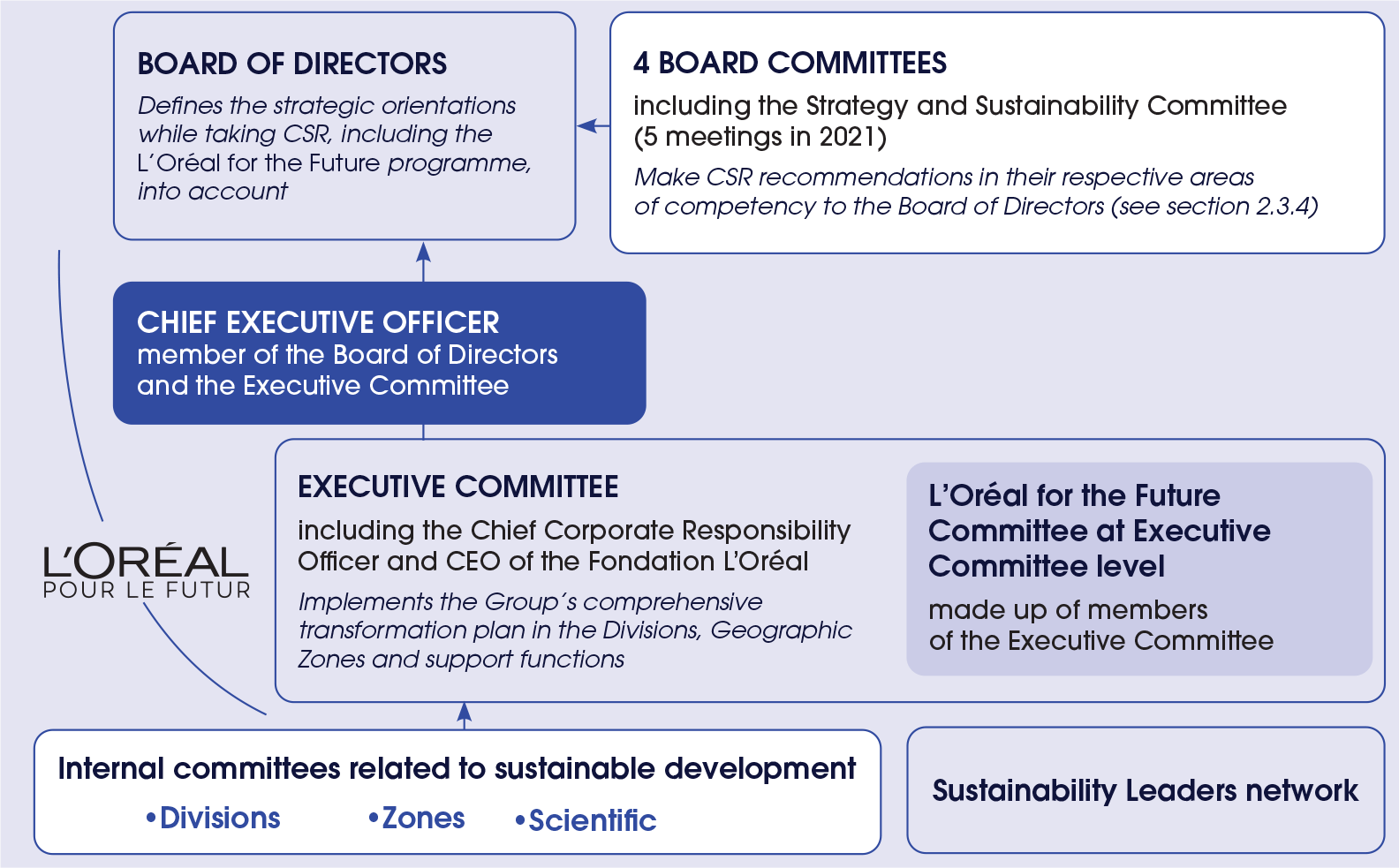Created in 2020, the mission of the Sustainable Finance Department is to integrate the environmental challenges from a financial standpoint. It reports to the Chief Financial Officer and to the Chief Corporate Responsibility Officer. It aims to develop and then manage Sustainable Finance actions by coordinating actions within the finance teams and further in corporating sustainable development into investment and acquisition decisions.
A strategic transformation driven by all
Sustainable development must be driven by all teams. All L’Oréal employees are encouraged to receive training on the challenges of sustainable development. They have access to a comprehensive range of online training courses available in 15 languages as part of the L’Oréal for the Future programme.
Remuneration structures have been revised at the highest level. The variable portion of the Chief Executive Officer’s annual remuneration incorporates quantitative and qualitative non-financial objectives, including objectives associated with the L’Oréal for the Future programme (and previously the Sharing Beauty with All programme). In order to ensure strong correlation with L’Oréal’s strategy for which economic and social performance go hand-in-hand, the long-term remuneration of the Chief Executive Officer includes criteria for non-financial performance in addition to financial performance (see section 2.4.). Moreover, non‑financial objectives in line with the Group’s goals for sustainability have since 2016 been included in the variable remuneration of the top management, including international brand managers and country managers.
Within the framework of ongoing dialogue and as part of a process which aims at making continual progress, L’Oréal takes into account its stakeholders’ expectations. With a representative panel of outside experts around the world, the Group has defined and developed a method of ad-hoc interaction that it considers to be the most efficient and appropriate. It has also set up bodies for important issues, for example in the form of a Women’s Advisory Board. These bodies aim to ensure that civil society’s expectations are sufficiently met with regard to these issues. The main stakeholder interactions are set out in section 4.1.2.
The Group is convinced that acting ethically is the only way to achieve sustainable success. In order to ensure that strong Ethical Principles – Integrity, Respect, Courage and Transparency – continue to guide the development of L’Oréal and contribute to establishing its reputation, the Chief Executive Officer can also rely on the Chief Ethics, Risk and Compliance Officer, who reports directly to him.
In 2022, true to its commitment to the Ten Principles of the UN Global Compact, L’Oréal participated in the Early Adopter programme. This involvement highlights its contribution to the UN Sustainable Development Goals, which are at the centre of its growth strategy.
CSR governance

This diagram represents the CSR governance.
The Board of Directors defines the strategic orientations while taking CSR, including the L’Oréal for the Future programme, into account.
The Board of Directors can rely on its 4 Board Committees, including the Strategy and Sustainability Committee (5 meetings in 2021).
The 4 Board Committees make CSR recommendations in their respective areas of competency to the Board of Directors. (see section 2.3.4)
The Chief Executive Officer, being a member of the Board of Directors and the Executive Committee, has to report on the Group’s activities to the Board of Directors.
The Executive Committee, including the Chief Corporate Responsibility Officer and CEO of the Fondation L’Oréal, implement the Group’s comprehensive transformation plan in the Divisions, Geographic zones and support functions.
L’Oréal for the Future Committee is at the same level as the Executive Committee and is made up of the members of the Executive Committee.
The Internal committees are related to sustainable development (Divisions, Zones, Scientific) and are at the same level as the Sustainability Leaders network.
Non-financial objectives in line with the sustainability goals included in the annual variable remuneration and long-term incentive(LTI) plans of the top management including the Chief Executive Officer
